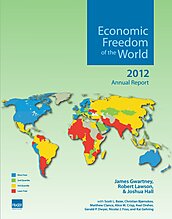The first Economic Freedom of the World Report, published in 1996, was the result of a decade of research by a team that included several Nobel Laureates and over 60 other leading scholars in a broad range of fields, including economics, political science, law and philosophy. This is the 16th edition of Economic Freedom of the World and this year’s publication ranks 144 nations for 2010, the most recent year for which data are available.
Worldwide economic freedom has bounced back slightly since falling during the global recession, according to the 2012 Economic Freedom of the World Report. After falling for two consecutive years following a long trend of increases, the average score rose from 6.79 in 2009 to 6.83 in 2010, the most recent year for which data is available. In this year’s index, Hong Kong retains the highest rating for economic freedom with Singapore, New Zealand, Switzerland, Australia, Canada, Bahrain, Mauritius, Finland, and Chile, taking top spots on the list. Bahrain and Finland are new to the top 10 — replacing, notably, the United Kingdom (fell to 12th) and the United States (a sizable drop to 18th).
The U.S., long considered the standard bearer for economic freedom among large industrial nations, has experienced a substantial decline in economic freedom during the past decade. From 1980 to 2000, the U.S. was generally rated the third freest economy in the world, ranking behind only Hong Kong and Singapore. After increasing steadily during the period from 1980 to 2000, the chain-linked EFW rating of the U.S. fell from 8.65 in 2000 to 8.21 in 2005 and 7.70 in 2010. The chain-linked ranking of the U.S. has fallen precipitously from second in 2000 to eighth in 2005 and 19th in 2010 (unadjusted ranking of 18th).
The rankings of other large economies in this years index are Japan, 20th; Germany, 31st; France, 47th; Italy, 83rd; Mexico, 91st; Russia, 95th; Brazil, 105th; China, 107th; and India, 111th.
